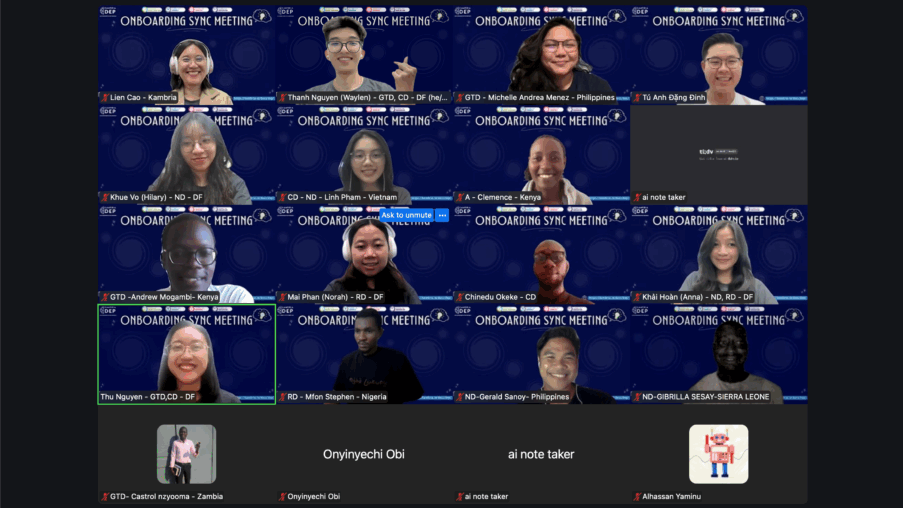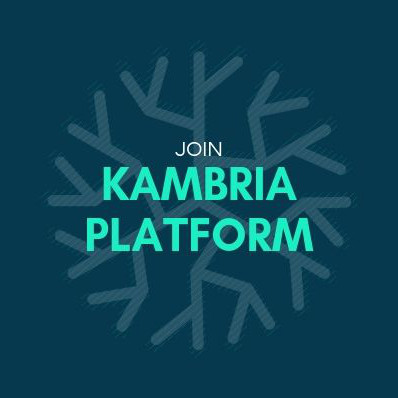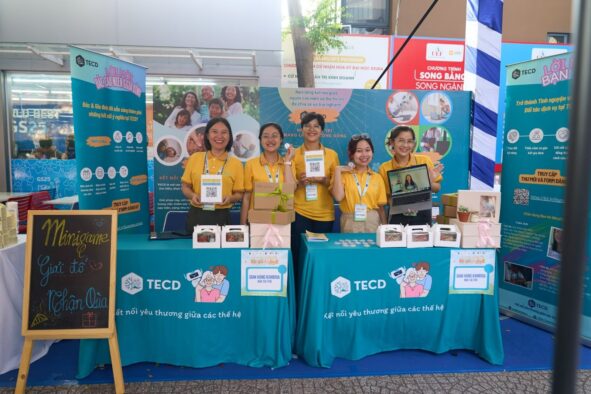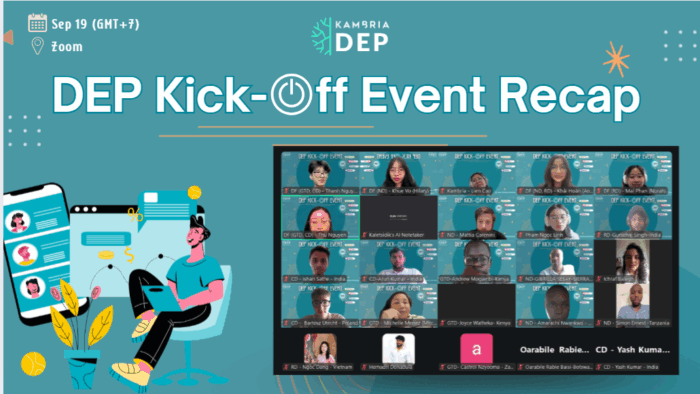
Table of Contents
- 1. Onboarding Sync Overview
- 2. Proposal Preview and Q&A
- 3. Share Onboarding Phase Feedback
- 4. Next milestones and Heartfelt Thanks
Kambria has successfully organized the DEP Onboarding Sync Meeting on Oct 10th, 2025.
This Meeting is for DAO Groups to present the proposals for final feedback and insights gained from all members (including those from other DAOs), ensuring members are well-prepared for the upcoming vote. This session also serves as a last opportunity to refine the proposal, promote the project, and invite volunteers - particularly DAO members based near the implementation site.
Key Highlights
- Onboarding Sync Overview
- Proposal Preview and Q&A
- Share Onboarding Phase Feedback
- Next milestones and Heartfelt Thanks
Esteemed Attendees
- Ms. Liên Cao - Kambria Core Team
- DAO Facilitators of the 4 DAOs including:
- Mr. Thanh Nguyễn and Me for Grow Together DAO and Connect DAO
- Ms. Hoàn Võ and Ms. Khuê Võ for Nourish DAO
- Ms. Hoàn Võ and Ms. Mai Phan for Reflection DAO
- Kambria Team member - Ms. Linh Phạm
- Tracking Assistant - Mr. Anh Đặng
- All DAO Members
Full video:
- - - - - 🔹 - - - - -
1. Onboarding Sync Overview
In this session, Ms. Liên Cao shared an overview of the key information to help DAO Members transition from the Onboarding Phase to the Execution Phase. The meeting aimed to align all DAOs, walk through proposal and voting workflows on XDAO, preview DAO proposals and Q&As, and reflect on learnings from Onboarding while reinforcing key tools, documentation, and DAO norms.
1.1. Reflecting on the Journey So Far
The session began with a review of the Program timeline, showing that participants have reached the end of the Onboarding Phase and are now entering the main Execution Phase.
All DAOs have completed their onboarding checklists and are currently finalizing their group proposals.
1.2. Proposal Submission, Voting, and First Payment Workflows
Ms. Liên Cao provided a detailed walkthrough of the upcoming workflows on XDAO, the platform used for proposal submission, voting, and fund management.
- October 10: DAO groups previewed and submitted proposals via the Create Proposal feature on XDAO, starting a 14-day voting period.
- By October 17: DAO Facilitators will complete preliminary qualification.
- Until October 24: DAO participants will vote on qualified proposals, listed in each DAO’s Voting Tracking Sheet.
- By October 31: The first payment will be processed for approved proposals.
She also reminded members that each DAO has its own DAO space on XDAO to submit and vote on proposals, with details available on the Onboarding Hub page in DEP Docs.
1.3. Opportunities and Challenges in DAO Experimentation
Ms. Liên Cao highlighted both the opportunities and challenges of using blockchain-based DAO platforms:
- Opportunities: Blockchain brings transparency, automation, and trust, enabling greater autonomy for decentralized communities.
- Challenges: These platforms are still at an early stage of development, and the user experience may not yet be fully intuitive. Members were encouraged to approach this phase with an exploratory and experimental mindset.
1.4. Voting and Payment Process
Members learned the steps to create proposals, vote, and process payments through MetaMask, which acts as an on-chain signature confirming actions.
During the proposal voting stage:
- DAO Members submit their proposals, review others within their group, and vote to select one for execution.
- DAO Facilitators list the qualified proposals in the Voting Tracking Sheet for final DAO voting.
Once a proposal passes, the DAO Facilitator initiates a Send Token voting for the first payment under the 70-30 payment model. After execution, DAO groups will submit a completion report, and the second payment will be initiated once the report is verified.
All transactions are transparent and traceable on-chain via the Transaction History section in XDAO, with public records viewable on Polyscan.
1.5. Learning and Improving
Reflecting on insights from the Onboarding Phase, Ms. Liên Cao emphasized both best practices and areas for improvement:
Good Practices:
- Strong Group Leaders and Key Members, supported by DAO Facilitators and Tracking Assistants.
- Group check-in calls as a key tool for communication and alignment.
- Clear communication channels: Email for announcements, Discord for discussions, and LinkedIn for individual check-ins.
Areas for Improvement:
- Low activeness from around 50% of participants. DAO Facilitators will schedule 1-1 check-in calls to increase engagement before considering Member Removal.
- Technical barriers for some members will be addressed by updating DEP Docs with clearer instructions.
- Concerns about decentralization will be tackled by encouraging members to take ownership of specific activities within their group proposals - ensuring collaboration feels more equitable and inclusive.
1.6. Feedback from DAO Members
Participants raised thoughtful feedback regarding:
- Fairness in project locations and benefits.
- Transparency in selection criteria.
- Opportunities for all members to contribute meaningfully.
She expressed appreciation for this feedback and encouraged members to actively take ownership of project components, such as leading specific activities or outcomes. She emphasized that voting outcomes - even when proposals don’t pass on the first try - are valuable learning opportunities for the DAO community.
1.7. Approach to Project Structure
Liên explained that the group-based approach was chosen to ensure effective coordination and efficient funding.
Each DAO group can propose multiple ideas, select one for execution, and distribute ownership among members. Volunteer Group Leaders help coordinate communication and progress.
This structure promotes democratic decision-making while enabling each group to build local initiatives collaboratively within the DAO framework.
1.8. Next Steps
From October 10-17, DAO Facilitators will:
- Support groups in improving proposals by breaking down activities for shared ownership.
- Conduct 1-1 check-in calls to increase activeness before the next phase.
All DAO-specific links - including each DAO’s XDAO space and tracking spreadsheets - are available in the DEP Docs for easy reference.
Through this session, Ms. Liên Cao and the Kambria Team reaffirmed their commitment to fostering transparent, inclusive, and experimental DAO collaboration, as Members move confidently into the Execution Phase.
Rewatch:
***
2. Proposal Preview and Q&A
In this session, Members presented their initial drafted proposals, followed by feedback and insights from the DAO Facilitators. Afterward, everyone joined an open discussion to exchange perspectives and refine ideas together. The session concluded with a Q&A segment addressing key questions collected from the Form.
Grow Together DAO
Members presented their initial drafted proposals
Group A - Mr. Andrew
Led by Andrew, Working Group A presented their proposal focused on planting 500 trees in Kisumu City, Kenya - specifically within the Impala Sanctuary by Lake Victoria. This reforestation effort aims to strengthen local ecosystems while engaging communities in long-term environmental stewardship.
During the session, Andrew shared updates on the team’s coordination with the Kenya Wildlife Service to source seedlings and technical support. The project team, composed of 9 members along with two on-site volunteers (Cipros and Tonya), is also collaborating with local Community-Based Organizations such as Happy Life, Kisumu Central, and Kamakoka to identify planting sites and mobilize community participation.
Group B - Ms. Mitch
Represented by Mitch from the Philippines, their project focuses on planting 500 native trees in Mount Balagbag, Metro Manila - one of the city’s critical watersheds. This effort will be carried out through two community action days, followed by four months of growth monitoring led by the Bantay-Gubat Rangers and Balagbag Environmental Society.
The initiative not only contributes to the DAO’s collective goal of 1,000 trees planted globally (in tandem with Kenya) but also aims to restore deforested areas, protect water sources, and build community engagement. Volunteers, local leaders, and DAO Members will collaborate in logistics, documentation, storytelling, and monitoring to ensure sustainability.
Feedback and insights from the DAO Facilitators
After both Group A and Group B presented, the DAO Facilitator commended their strong effort and well-structured proposals - especially the clear planning for the tree planting initiative, which demonstrated solid groundwork and early preparation. Both teams were praised for starting early, staying actively engaged in discussions, and maintaining good coordination throughout the process.
However, the facilitator emphasized that a truly strong proposal should not only be executable but also align with the spirit of decentralization that defines the DEP. While the on-site tree planting project was well developed, the online skill-sharing workshop still lacked clarity and depth even though it plays a crucial role in promoting decentralized collaboration among members across different countries.
To strengthen the proposal, the Facilitator suggested five key improvements:
(1) assign different leads for each initiative to ensure shared leadership;
(2) include clearer details for the online session such as objectives, topics, and registration;
(3) allocate part of the contingency fund to support the activity;
(4) appoint two co-treasurers for transparent fund management; and
(5) define measurable outcomes to capture learning results, like summary posts or reflection reports.
Overall, the Facilitator concluded that with these adjustments, both groups’ proposals would better align with DEP’s decentralization goals and ensure smoother, more inclusive implementation moving forward.
Open discussion
After the presentations, the floor opened for an open discussion where Members from different DAOs exchanged reflections and shared feedback. Ishan from Connect DAO acknowledged the impressive effort and collaboration shown in developing the proposal. Many noted that the project was well-structured, with clear task assignments and a strong sense of teamwork throughout the process.
Castrol from Grow Together DAO also expressed appreciation for the project’s potential long-term impact. He encouraged the team to explore tree varieties that could grow and regenerate quickly - turning the initiative into a self-sustaining effort rather than one dependent on external funding.
Overall, the discussion highlighted a shared excitement and thoughtful engagement toward building meaningful, decentralized solutions, capturing the collaborative spirit that drives the DEP community.
Q&A segment addressing key questions collected from the Form
To close the Proposal Preview session, the Facilitators addressed key questions collected from the pre-meeting form.
1. How does group member participation vs partner member/local participation count?
- DAO group members are official DAO participants whose actions count toward governance metrics like voting, proposal submission, and execution reporting.
- Partner or local members support project implementation (e.g., volunteers, local partners) - their activities count toward project impact results, not DAO governance.
- DAO members handle coordination; partners enable on-the-ground execution.
2. How will proposals be prioritized and selected?
The second question asked how proposals would be prioritized and selected. The facilitators explained that qualification for voting follows the Proposal Qualification Checklist, which ensures fairness and readiness across all submissions. The final selection, however, will be determined entirely by DAO Member voting through XDAO - reinforcing the decentralized decision-making structure of the program.
Rewatch:
Connect DAO
Members presented their initial drafted proposals
Mr. Okeke
Representing Connect DAO, Okeke presented his proposal titled “Digital Literacy and Memory Games for Seniors”, which aims to strengthen intergenerational relationships through digital engagement and interactive activities.
The initiative focuses on fostering meaningful conversations and shared learning experiences between Seniors (aged 40 and above) and younger participants (SeniorBuddies). By integrating digital literacy and memory games, the project hopes to make intergenerational exchanges more engaging, inclusive, and enjoyable.
Okeke proposed hosting the activities at the Senior Staff Club of the University of Nigeria, beginning with a physical onboarding session to help participants connect personally, followed by online tech-assisted meetups for ongoing interaction. The program will emphasize empathy, inclusivity, and education - ensuring that both generations can learn from one another.
The implementation plan is structured in three phases:
- Preparation Phase: Setting up TECD app accounts, drafting session materials, and submitting proposals for review.
- Execution Phase: Refining the proposal based on feedback, completing facilitator review, and proceeding to funding approval.
- Implementation & Reflection Phase: Conducting the sessions, documenting outcomes, and sharing key learnings through reflection meetings and reports.
The project aims to engage around 20-30 senior participants and 3 local volunteers, with completion expected by November 30th, 2025.
While the online sessions will require minimal funding, small physical meetups may include costs for logistics and refreshments.
Okeke concluded his presentation by sharing photos of the Senior Staff Club and the surrounding university area, expressing his enthusiasm for making digital inclusion a pathway for stronger, more connected communities.
Feedback and insights from the DAO Facilitators
The Facilitator commended Connect DAO Members for presenting a thoughtful and heartfelt proposal that clearly aligns with the DAO’s mission of fostering intergenerational connection. The project’s focus on digital literacy and memory games was recognized as a creative and meaningful way to bring Seniors and SeniorBuddies closer together.
Several strengths were highlighted:
- The proposal strongly reflects Connect DAO’s purpose, emphasizing inclusion, empathy, and shared learning.
- Its warm, human-centered approach demonstrates genuine care for seniors’ experiences and well-being.
- The three-phase implementation plan was praised for its clear structure and built-in reflection process.
- The specific measurable outcomes - including engaging 23 Seniors and 3 volunteers by November 30 - make the proposal concrete and trackable.
To further strengthen the plan, the Facilitator recommended several improvements:
- Clarify DAO member roles by assigning responsibilities for coordination, training, logistics, and reporting.
- Expand the budget section with itemized costs and clear explanation of fund management, whether through MetaMask or local currency.
- Enhance collaboration by identifying potential local partners such as NGOs or university clubs to improve outreach and sustainability.
- Include a short risk assessment, addressing possible issues like low digital literacy or attendance, and outline steps for mitigation. Mentioning data privacy measures for photos or recordings was also encouraged to build participant trust.
Overall, the feedback emphasized how refining these areas would increase both clarity and long-term impact, ensuring the proposal continues to embody the values of decentralization and human connection at the heart of Connect DAO.
Open discussion
During the open discussion, participants exchanged reflections and constructive feedback to further enhance the Connect DAO proposal. The conversation mainly revolved around the digital literacy aspect and how to ensure meaningful participation of Seniors, especially those who may have limited technological experience.
Members appreciated the initiative’s intent to empower Seniors through digital learning and acknowledged the thoughtful structure of the plan. However, several practical considerations were raised to strengthen the project’s feasibility and inclusiveness.
One key point discussed was the need for on-site technical support - suggesting that having one or more tech-savvy facilitators available at the Senior Center could help bridge the digital gap and prevent frustration during online sessions. The discussion also highlighted the importance of patience and adaptability from both Seniors and volunteers when working with technology, as even small technical differences between devices can cause confusion.
Overall, the exchange emphasized that providing adequate local assistance, clear instructions, and empathy-driven facilitation will be crucial to ensuring that all Seniors, regardless of their digital skill level, can fully participate and enjoy the intergenerational connection experience.
Q&A segment addressing key questions collected from the Form
We noted 1 key question from the Member.
1. Will there be ongoing mentoring or structured support available for DAO members after the onboarding phase?
The organizing team clarified that mentoring and structured assistance will continue throughout the program. DAO Facilitators will remain available to provide online consultation and guidance whenever needed, while local delivery partners may offer additional support depending on their location and availability.
To further strengthen collaboration and collective learning, an Execution Sync Meeting is scheduled for November 28, where all DAOs will come together to share updates, challenges, and lessons learned from their implementation journeys.
Rewatch:
Nourish DAO
Members presented their initial drafted proposals
Group 1 - Mr. Yaminu
Representing Group 1, Mr. Yaminu presented the proposal titled “Nutrition DAO Meals for Vulnerable Families in Freetown Communities,” developed under the Heart of Home Foundation in Sierra Leone. The initiative aims to empower vulnerable families through education, healthcare, and social support, while directly addressing food insecurity among the elderly, children, and people living on the streets.
The project plans to prepare and distribute 500 nutritious meals to vulnerable groups across Freetown and neighboring areas, targeting completion by October 26, 2025. The plan unfolds across three clear phases:
- Phase 1 - Preparation and Outreach: Identify target families and early centers, recruit local volunteers, and promote awareness through posters and social media campaigns.
- Phase 2 - DAO Review and Funding: Submit the proposal to Ex-DAO for qualification, voting, and fund release (70% of the total $700).
- Phase 3 - Implementation and Reporting: Purchase ingredients and packaging, prepare meals over five days, distribute to 500 beneficiaries, and document the process with photos, receipts, and beneficiary feedback.
The proposed budget totals $1,497.59, covering meal preparation, packaging, volunteer support, documentation, bottled water, and drinks - averaging $2 per meal. Partnerships play a key role in this proposal. The team plans to collaborate with civil society organizations, community-based organizations (CBOs), media partners, local government authorities, and youth leaders to enhance coordination, visibility, and sustainability.
In closing, Mr. Yaminu emphasized that this initiative contributes to the broader goal of reducing hunger and poverty in Sierra Leone, aligning with the mission of the World Food Programme and the World Bank to combat food insecurity across Africa.
Group 2 - Mr. Sanoy
Representing Group 2, Mr. Sanoy presented the proposal titled “Nourishing Body and Mind: 1,000 Meals for Geographically Isolated and Environmentally Sensitive Communities in Siargao Island, Philippines.” The project, led by the Cryptoo team, aims to deliver nutritious meals while empowering local communities through sustainable, low-waste food distribution practices.
The proposal targets seven remote communities in Siargao Island - including Sitio Liaonan, Sitio Sugba, Sitio Ilihan, Sitio Bagacay, Sitio Cadyukan, Sitio Mahayahay, and the resettlement area for landless and homeless families. These areas are geographically isolated and require boat transportation of 40 minutes to 1 hour to reach, making access to food and services especially challenging.
The project’s goal is to prepare and distribute 1,000 healthy meals for children aged 4–16 years old who are at risk of malnutrition. It also aligns with Nourish DAO’s collective goal of promoting food security and with the UN Sustainable Development Goals on ending hunger and improving nutrition.
The implementation follows four main phases:
- Phase 1 - Research & Planning: Identify target communities, coordinate with local leaders and mothers, and prepare awareness materials.
- Phase 2 - Proposal Submission: Submit and refine the proposal for DAO voting and funding.
- Phase 3 - Execution (Oct 26 - Nov 30): Purchase ingredients, conduct three meal service days, document the activities, and collect feedback.
- Phase 4 - Final Reporting: Summarize outcomes, submit documentation, and reflect on project impact.
The total proposed budget is $1,500 USD, with a breakdown including:
- $1,000 for ingredients and meal preparation (thanks to a farm-to-table model that reduces cost by sourcing produce locally),
- $150 for logistics (mainly boat transport),
- $200 for volunteer support, and
- Remaining funds for documentation, printing, and contingency.
A key sustainability feature of the plan is its low-waste approach - community members will bring their own plates to minimize packaging waste. The project will be implemented in collaboration with Espoir School of Life, a local educational partner supporting community feeding and nutrition awareness programs. Mr. Sanoy concluded the presentation by showing a short video featuring the school and local children, highlighting the project’s compassionate spirit and the community’s readiness to participate.
Feedback and insights from the DAO Facilitators
The Facilitators praised Nourish DAO for its strong alignment with the mission of tackling food insecurity among children in remote areas. The proposal showed clear organization, even exceeding targets with 1,000 meals across three service days, and demonstrated meaningful community engagement through collaboration with local leaders, mothers, and youth volunteers.
To further strengthen the project, the facilitators suggested:
- Clarifying DAO member roles to ensure active participation from all members.
- Expanding impact beyond meal preparation by creating educational content on nutrition and hygiene.
- Enhancing risk management with backup plans for weather or supply challenges.
Overall, Nourish DAO is on a promising path - well done, and keep nourishing with purpose!
Open discussion
During the open discussion, members reflected on their first experience collaborating across borders to build a DAO proposal.
Key challenges shared:
- Communication across time zones - coordinating between members in different countries made it difficult to stay active in discussions.
- Scattered communication channels - switching between Discord, LinkedIn, and email sometimes caused confusion or delays.
Key takeaways: Despite these hurdles, members expressed that they’ve found creative ways to stay connected and appreciated the unique learning experience of working in a decentralized environment. Facilitators also acknowledged this as a valuable lesson for Kambria’s first DAO cohort, encouraging more feedback to improve future collaboration.
Q&A segment addressing key questions collected from the Form
During the Q&A session, participants raised two key questions about partnership inclusion and member participation.
1. Is it possible to include local partners ensuring that more vulnerable people have access to nutritious meals, through this more people will be aware of your impact and the Kambria will be the leading innovator?
The first question asked whether it is possible to include local partners to ensure that more vulnerable people have access to nutritious meals. The Kambria team confirmed that this is absolutely welcomed. During the execution phase, DAO members who connect with external or local partners for support are encouraged to inform the team so that these partners can be properly recognized and connected within Kambria’s broader community network.
2. Given the recent low turnout and limited participation from some members, which may affect the voting threshold and overall decision-making process, what measures will be taken to address this challenge? Specifically, how will the DAO handle situations where participants are unwilling or unable to fully engage or perform their assigned roles, and what impact will that have on the final outcomes of the project or voting process?
The second question addressed concerns about low turnout and limited participation from some members, which may affect decision-making and project outcomes. To address this, the Kambria team shared that DAO Facilitators will conduct one-on-one check-ins with inactive members to encourage re-engagement. Members who remain inactive without valid reasons may be reviewed or removed according to the Member Termination Policy. DAO groups are also encouraged to break down project outcomes into smaller tasks so that each member can take ownership of specific parts.
For instance, Nourish DAO members can go beyond meal preparation by developing educational materials such as posters or short talks on balanced diets and hygiene to promote awareness and encourage active participation from all members.
Rewatch:
Reflection DAO
Members presented their initial drafted proposals
Representing Reflection DAO, Mr. Mfon presented the group’s first draft proposal, focusing on capturing stories and insights from all DAOs to make their collective learning visible and valuable for future practitioners.
The project’s main goal is to collect and document 50 meaningful reflections from around 30 contributors across all DAOs. By doing so, Reflection DAO aims to build a knowledge base that highlights the invisible learning journeys within the DAO ecosystem - ensuring that every experience and voice is acknowledged. Their outputs will take creative formats such as infographics and reports, using online forms, videos, and one-on-one discussions to gather authentic stories and insights. The team emphasized that this initiative seeks to promote compassion, dignity, and collective learning, while fostering stronger DAO connections through storytelling. The proposed budget and external collaboration plans are still in progress, with a focus on including co-storytellers and graphic designers to produce visually engaging materials.
Feedback and insights from the DAO Facilitators
After several collaborative rounds, the facilitators provided key feedback to help strengthen Reflection DAO’s proposal while maintaining decentralization.
Strengths
- The proposal shows a strong alignment with Reflection DAO’s mission - amplifying learning through authentic human stories. Its emphasis on compassion, dignity, and authenticity reinforces a meaningful cultural foundation.
- The plan is clear and feasible, with a well-paced timeline and structured Reflection Collection Days that can serve as a model for future cohorts.
- Additionally, measurable outcomes - including 50 reflections, 30 contributors, and 3 collection days - make progress easy to track and assess.
Areas for Improvement
- The facilitators suggested clarifying team participation, particularly defining the roles of “supporter” members to ensure active contribution.
- They also recommended optimizing the budget, such as reducing software or tool expenses and redirecting funds toward creative storytelling outputs using Kambria-supported tools like Drive storage.
- Finally, the team is encouraged to add a risk management plan, addressing potential challenges like low contributor engagement or delays to ensure timely completion.
Open discussion
During the open discussion, participants shared constructive feedback to help improve Reflection DAO’s proposal and overall presentation approach. One member suggested that future presentation slides should highlight key points or keywords, as many decks currently contain dense text. Emphasizing or underlining essential ideas would help audiences grasp the main messages more effectively and avoid misinterpretation. The facilitators thanked the speaker for this valuable suggestion and noted it for future improvement.
Additionally, it was emphasized that Reflection DAO holds a unique role within the DEP - instead of engaging external communities, the team will work directly with other DAO members to collect insights and learning experiences throughout the program. All DAO participants were encouraged to openly share their reflections and stories when approached by Reflection DAO, to help document the collective journey of this first cohort.
Rewatch:
***
3. Share Onboarding Phase Feedback
In this session, Ms. Khuê Võ expressed sincere appreciation to all DAO Members who took the time to share their reflections and feedback - both through the Feedback Form and during the live discussion. She noted that the responses were encouraging and insightful, providing both recognition for what worked well and actionable suggestions for improvement.
During the Onboarding Phase, feedback was collected from 25 DAO Members, representing all DAOs within DEP, ensuring a broad and balanced perspective across teams.
Feedback Overview
Members were asked to rate three key areas:
- Clarity of the onboarding process
- Helpfulness of onboarding materials
- Overall support provided
The results were very positive, with ratings ranging from 3 to 5 points and no low or extremely low scores reported - a strong indicator of overall satisfaction with the onboarding experience.
Key Feedback Themes
Ms. Khuê Võ shared that three main themes emerged from the written feedback:
- Helpful Resources: Participants appreciated the clear guides, materials, and timely reminders, which supported them throughout onboarding.
- Suggestions for Simplification: Some members mentioned that the calls and processes felt lengthy or complex, and suggested improvements such as adding a simple visual map or a one-page summary to make information easier to follow.
- Clarifications Needed: A few members raised specific questions about topics like uploading to XDAO or funding procedures. Ms. Khuê explained that these topics will be covered in the Execution Phase and that supporting materials are available on DEP Docs for quick reference.
To close, Ms. Khuê once again thanked all participants for their thoughtful input, emphasizing that their feedback plays an essential role in helping the Kambria team learn, improve, and enhance future DAO experiences.
Rewatch:
***
4. Next milestones and Heartfelt Thanks
The next milestones include:
- Finalize proposal adjustments by the end of October 15 or October 16, depending on each DAO’s timeline.
- Explore proposals within the DAO to prepare for the voting period (October 17–24).
- Stay in close communication with DAO Facilitators on Discord during the Execution Phase after voting concludes.
For full details, you can always check the official website: https://kambria.io/docs/dep/program-timeline/
Thank you to all our Members for joining the Onboarding Sync Meeting! We truly appreciate your active participation and valuable contributions throughout the discussion. Your energy and collaboration made this Meeting a success - and we look forward to continuing the journey together in the next phase.
Rewatch:







